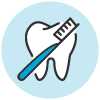Why is preventative dentistry so important?
Prevention is better than a cure, as you’ve no doubt heard often enough. Many of the dental issues we see at the clinic can be avoided or, at the least, minimised if picked up early in their development. The sooner we catch a problem, the less invasive the treatment is, which saves you time and money in the long run.
What’s involved in a regular dental check-up?
A regular dental check-up prevents many dental issues from occurring or becoming severe. Three steps are involved:
- Your dentist will thoroughly check all of your teeth for signs of decay, cracks and wear.
- They will check the soft tissue of your mouth, lips and gums for any abnormalities and assess the overall health of your gums.
- Lastly, they’ll perform a scale and clean to prevent gum disease.
What is gum disease?
Gum disease (periodontal disease) develops quietly, producing no obvious symptoms until it’s well advanced. It starts when plaque remains on your teeth after brushing, irritating your gums and causing them to become slightly red and swollen. Your gums then start to draw away from your teeth, leaving behind pockets that trap more plaque and are very hard to clean.
To make matters worse, when minerals contained in your saliva come into contact with plaque, it hardens the plaque into a cement-like substance (calculus) that is impossible to clean off with your tooth brush at home.
The disease continues to progress from there, slowly reducing the height of your gums and bone that support your teeth until your teeth resemble a fence post in a too-shallow hole, flapping in the breeze.
Gum disease is one of the best examples of the importance of preventative dentistry. With no obvious symptoms in the early stages, it’s vital that regular check-ups and cleans with your dentist are incorporated into your oral health regime to prevent this disease from progressing unchecked.
What are signs of gum disease?
While difficult to pick up in its infancy, there are some signs to be on the lookout for when it comes to gum disease.
- Your gums bleed when you brush them.
- Your teeth look longer than normal.
- Your teeth feel loose.
If you notice any of these markers, please give us a call straight away so we can assess the health of your gums.
Your role in preventative dentistry
When it comes to keeping your oral health in pristine condition, you play the biggest role. The importance of regular brushing, flossing and rinsing cannot be overstated. These three simple acts are the biggest barrier between you and costly, time-consuming dental treatments. They must become regular habits.














